Arts Feature: Top Classical Recordings and Concerts of 2023
Our classical music critics supply their favorites, albums and concerts, from over the past year.
Jonathan Blumhofer
2023’s Top Albums
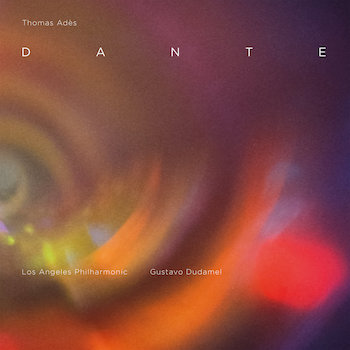
Adès, Dante (Nonesuch)
Nearly everything about Thomas Adès 90-minute-long balletic adaptation of The Divine Comedy impresses: its mix of freshness, exuberance, mystery, and invention is non-stop. On top of that, the performances here from the Los Angeles Philharmonic, Los Angeles Master Chorale, and Gustavo Dudamel are spot-on; this is a triumph for everyone involved.
God’s Time (Tiger Turn)
Hardly any composer’s music transfers better from one instrument to another than J. S. Bach’s. That’s a fact that guitarist Aaron Larget-Caplan intuits to his (and our) advantage in this beautiful, stylish survey of pieces big and small by the Baroque master.
Liebestod (Accentus)
Liebestod’s program (staples by Wagner, Mahler, and Richard Strauss) doesn’t suggest surprises. But the performances Jakub Hrůša draws from the Bamberger Symphoniker are anything but dull or complacent. Instead, this is late Romantic fare played with just the right degree of purpose and color – and it takes on new life as a result.
Weill, Symphonies (Bis)
Kurt Weill’s two symphonies are hardly repertoire favorites. But they’re awfully good pieces, especially when performed with the focus and intensity HK Gruber and the Swedish Chamber Orchestra offer on this release. The bonus tracks – Gruber performing selections from Der Silbersee – are just icing on the cake.
Bartók, Orchestral music (Pentatone)
Karina Canellakis dazzled conducting Lutoslawski at Symphony Hall in January and she does the same here, in this showcase of two Bartók orchestral works: the knotty Four Orchestral Pieces and the Concerto for Orchestra. Hers are interpretations of real insight and understanding with performances to match.
Corigliano, Piano music (Naxos Classical)
The 85-year-old John Corigliano remains one of the vital voices in contemporary music and this overview of keyboard music he composed between 1968 and 2008 reminds why. They crackle with energy and a sense of discovery – and the composer hardly ever repeats himself. It almost goes without saying that the performances by Philip Edward Fisher and the Albany Symphony are first-rate.
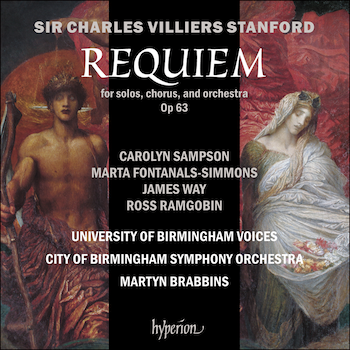
Stanford, Requiem (Hyperion)
Charles Villiers Stanford’s beautiful 1896 Requiem got the royal treatment this year with a deeply felt recording from Martyn Brabbins, the City of Birmingham Symphony Orchestra, the University of Birmingham Voices, and soloists. Channeling the meditative approach of Fauré and Brahms, Stanford crafted something that speaks with immediacy and warmth, and that’s movingly conveyed on this album.
Tchaikovsky, Symphony No. 5 (Reference Recordings)
Manfred Honeck and the Pittsburgh Symphony continued their outstanding survey of canonic favorites with a magnificently intense reading of Tchaikovsky’s Fifth Symphony that’s paired with a vivifying arrangement of Erwin Schulhoff’s acerbic Five Pieces. As usual, everything here dazzles.
Spanish Impressions (Reference Recordings)
The Hermitage Piano Trio’s performances of music by Iberian composers included more than a few surprises and musical revelations. Maybe the most enduring was the sheer verve of the ensemble, whose way with selections by Joaquín Turina, Enrique Arbós, Mariano Perelló, and Gaspar Cassadó was never less than commanding.
Aux étoiles (Bru Zane)
The mastery of French composers writing symphonic poems and overtures is paid invigorating tribute by the Orchestre National de Lyon and Nikolai Szeps-Znaider. Much of this fare is unfamiliar and, even if all of it doesn’t operate at the same musical level, the best of it – Vincent d’Indy’s Istar, Chabrier’s España, and César Franck’s La Chasseur maudit among them – is exquisite.
Collective Wisdom (Bright Shiny Things)
The impossible-to-pigeonhole quintet Sybarite5 marked a turnover in membership with a new release that highlighted both the ensemble’s technical virtuosity and their stylistic versatility. The selections span more than a century, but all are marked by the same spirit of inquisitiveness and discovery that make it impossible to look away – or to leave bored.
Other Releases
Invariably, more recordings come across my desk than I’m able to review. 2023 was no exception in this regard; what follows are some conspicuously fine discs that I listened to but wasn’t able to write up in full.
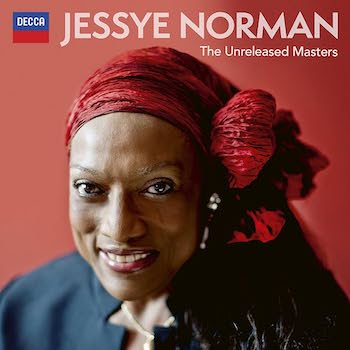
Chief among those was “Jessye Norman, The Unreleased Masters,” a set of three discs that had been collecting dust in Decca’s vaults since the 1990s: during her lifetime, the exacting soprano had refused to countenance their release. Thankfully, her estate thought otherwise and now this collection of works by Wagner, Richard Strauss, Haydn, Berlioz, and Britten is available to the public.
Aficionados may speculate as to what drove Norman’s reluctance to release them; ultimately, the set is an opportunity to enjoy the incomparable singer in her radiant prime. Local listeners might especially appreciate the third disc, a set of solo cantatas taped with the BSO and Seiji Ozawa at Symphony Hall in 1994.
The Schumanns, Robert and Clara, plus their friend Johannes Brahms have provided plenty of programmatic fodder for keyboardists of late (especially those just discovering Clara’s remarkable output). Pianist Benjamin Grosvenor’s survey of music by the trio (on Decca) – Robert’s Kreisleriana and Piano Sonata No. 3 (and smaller pieces), plus Clara’s Variations on a Theme of Robert Schumann and Brahms’ op. 117 Intermezzos – ranks with the best of them: poetic, intense, and brimming with passion.
Hilary Hahn has long been the preeminent violinist of her generation. But even such knowledge didn’t quite prepare for the superb account of Eugene Ysaÿe’s six Sonatas she released earlier this year on Deutsche Grammophon. This isn’t just great violin playing; rather, it’s great music making, Ysaÿe’s complex, virtuosic scores coming across with astonishing lightness, clarity, and direction.
Another terrific DG release was the Danish National Symphony Orchestra’s traversal of the six symphonies by Carl Nielsen with Fabio Luisi. This is music as inimitable as it is idiosyncratic, and the Danish players have its full measure. There hasn’t been a shortage, exactly, of Nielsen cycles of late but this is quite possibly the best of them – old and new.
Equally striking is Igor Levit, whose big concept albums these last several years have plumbed all sorts of fruitful musical depths. This year’s Fantasia (from Sony Classical), was no different, bridging the distance from J. S. Bach to Ferruccio Busoni by way of Franz Liszt and Alban Berg with a logic that was entirely its own. Maybe it was just the musicianship on offer. Or maybe it was the sheer chutzpah of the effort (what other pianist would pair the B-minor Sonata with Busoni’s ferocious Fantasia Contrappuntistica?). Either way, Levit’s artistry was the star here – and a blazing one it is.
Aaron Keebaugh
Best concerts of 2023
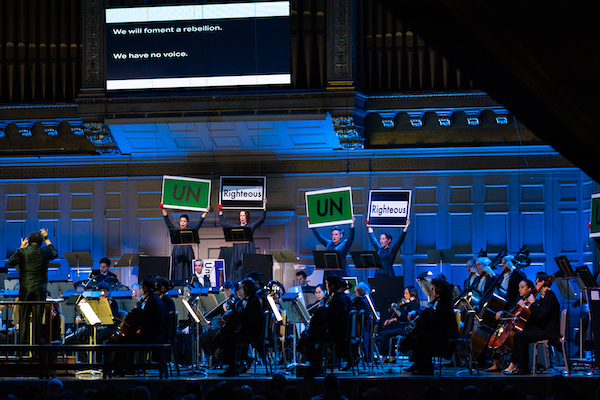
Lorelei Ensemble, conductor Giancarlo Guerrero and the BSO performing Julia Wolfe’s “Her Story.” Photo: Robert Torres
Julia Wolfe’s Her Story with the Lorelei Ensemble and the Boston Symphony Orchestra
Julia Wolfe has proven time and again that minimalism can provide the ideal soundtrack to new perspectives on historical events. But in the case of Her Story, the music underscored, with almost stoic assurance, the fiery passions generated by women’s suffrage.
Wolfe’s thirty-minute musical and theatrical spectacle, which showcased the full powers of the Lorelei Ensemble and Boston Symphony Orchestra, celebrated one hundred years of women gaining the vote. The work probed the wayward political tensions as well as the hard-won triumphs. Still its overall message struck a timeless chord: defiance in the face of adversity is what lingers most in memory.
Earl Lee in his subscription debut with the Boston Symphony Orchestra
The first rule for new conductors may be to not upstage the boss. But when assistant conductor Earl Lee made his subscription debut with the Boston Symphony Orchestra this past Spring, it became clear that he is a dynamic force that cannot be ignored by either musicians or audiences.
Lee’s program of Unsuk Chin’s subito con forza, Mozart’s Piano Concerto in D minor, and Robert Schumann’s Symphony No. 2 revealed his keen eye to detail, thoughtful ensemble balance, and adroit sensitivity to teleological build. Let’s hope the BSO has him back on the podium more often.
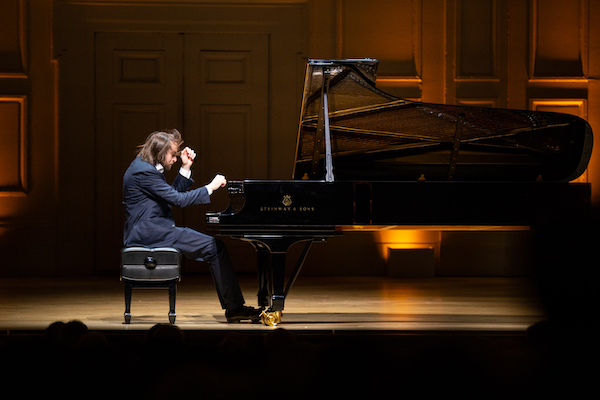
Daniil Trifonov in action at Boston’s Symphony Hall. Photo: Robert Torres/Celebrity Series of Boston
Daniil Trifonov in Celebrity Series recital
There may be no greater contemporary embodiment of the historic Russian piano school than Daniil Trifonov. His return via a solo recital presented by Celebrity Series this fall channeled all the interpretive depth and panache that the greats were known for.
Boston Baroque presents Gluck’s Iphigénie en Tauride
2023 proved a solid year for opera, with several organizations presenting works both old and new. Of the former, Boston Baroque’s intimate and traditionally costumed staging of Gluck’s Iphigénie en Tauride wove an arresting tale of friendship, family, and hope inspired by the gravest of situations.
Boston Camerata’s staging of Purcell’s Dido and Aeneas
An orchestra of little more than a string quartet supported the Boston Camerata’s fine cast of singers. But the performance conveyed the emotional power of this Purcell favorite. As is often the case with the company’s smart and economical productions, less is indeed more.
Guerilla Opera: Koh’s HER | alive.un.dead.
One of the highlights of this operatic season came by way of Guerilla Opera, who presented Emily Koh’s HER | alive.un.dead, a thornily scored, twisted tale of the struggle for independence in the face of generational trauma. Sol Kim Bentley and Nina Guo respectively expressed, with considerable skill and poise, the flirtatious swagger and youthful vigor of a mother and daughter who suffer unduly at the hands of strict parents.
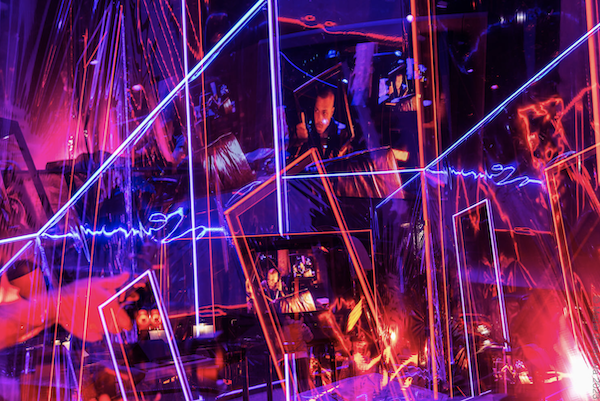
A scene from MIT’s Opera of the Future and Media Lab staging of VALIS. Photo: Maria Baranova
Tod Machover’s VALIS
MIT’s Opera of the Future and Media Lab cast new light on a modern tour-de-force this past September. Newly created electronic and A.I. instruments shattered any lingering sense of the traditional in Machover’s soundscape. The music soared, galumphed, and stung the ears with sounds worthy of a drug-addled rave — this was welcome shock treatment for contemporary opera.
Yo-Yo Ma in Shostakovich’s Cello Concertos with the Boston Symphony Orchestra
Yo-Yo Ma’s performances of both of Shostakovich’s Cello Concertos with conductor Andris Nelsons and the Boston Symphony Orchestra conveyed all the power, honesty, and directness that the cellist and composer are revered for.
But more than that, Ma’s readings also evoked an eerie poignancy that resonated with the ongoing wars in Ukraine and Israel. Via Ma, Shostakovich’s sardonic attempts at speaking truth to power rang with new urgency. The evening’s embrace of reality was a testament to Jeremy Eichler’s observation in his book Time’s Echo: “Art remembers what society would like to forget.”
Susan Miron
Best concerts of 2023
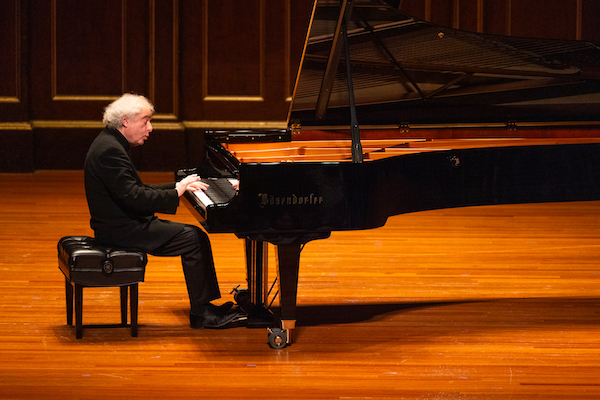
Sir András Schiff at Jordan Hall. Photo: Robert Torres
Pianist András Schiff at Jordan Hall
The pianist provided a 150-minute long procession of anecdotes, thoughts, and absolutely first-class playing for his adoring, thoroughly attentive audience, who happily bought tickets to hear whatever Sir András Schiff chose to play.
Pianist Evgeny Kissin at Symphony Hall
From beginning to end, this was a magical concert: beauty, poetry, and yes, unbelievable chops.
Pianist Beatrice Rana at at Longy’s Pickman Hall
Rana has a particular talent for building a line in ways that are both exactingly dynamic and robustly emotional.
Mercury Orchestra at Sanders Theatre in Cambridge
Mercury Orchestra is made up of seriously committed players, and they did a phenomenal job of bringing Mahler’s death-haunted work to life.
The Escher String Quartet at Rockport
It could be discerned, immediately, how adept these players were — and how brilliantly they played together.
2023’s Top Albums
Diabelli Variations, Beethoven — Shai Rosner (Onyx)
Schwanengesang, Franz Schubert — Ian Bostridge and Lars Vogt (Pentatone)
Steve Elman
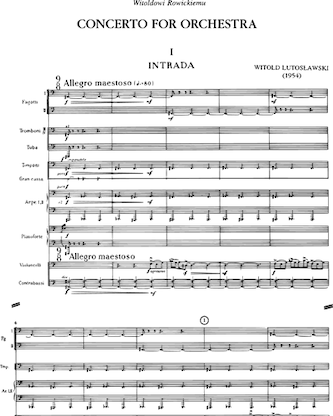
February 21: Witold Lutosławski: Concerto for Orchestra – Boston Symphony Orchestra, Karina Canellakis, conducting; w. Karel Szymanowski: Violin Concerto No. 2 w. Nicola Benedetti, violin soloist; at Symphony Hall.
The opportunity to hear one of the most important works by one of the twentieth century’s most brilliant composer-orchestrators proved to be the transcendent experience it promised. Canellakis, making her BSO debut at the podium, presided over a triumph – committed, precise playing of a very difficult score, and the precious experience for an audience of hearing a great work in three dimensions. Bemedetti’s performance of the Szymanowski concerto was superb, but the Lutosławski was the reason to be there.
May 6: Benjamin Britten: Violin Concerto, w. Augustin Hadelich, violin soloist; Dmitri Shostakokovich: Symphony No. 13, “Babi Yar” w. Matthias Goerne, bass-baritone, and men of the Tanglewood Festival Chorus – Boston Symphony Orchestra, Andris Nelsons conducting.
Nelsons courageously paired two of the most sober works of the twentieth century, and his inspired leadership made the evening a rich counterpoint to a time of war in eastern Europe. Britten’s concerto, filled with foreboding, was written as World War II loomed and seemed inevitable. Shostakovich’s symphony is a meditation on the hardships of life in the USSR, using texts by Yevgeny Yevtushenko, anchored by a poem lamenting the Jewish victims of a 1941 Nazi massacre in Ukraine and decrying anti-Semitism in general. The performers rose to all the mighty challenges, with Hadelich and Goerne vividly memorable and the TFC’s men deeply committed partners to the orchestra. This is hardly music to bring an audience to its feet, but there were standing ovations nonetheless, and well-deserved.
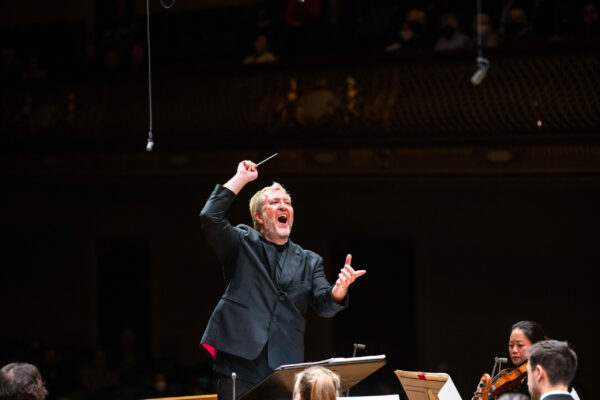
Thomas Adès conducts the BSO in his Inferno Suite. Photo: Robert Torres
November 17: Gyorgy Ligeti: Piano Concerto, w. Kirill Gerstein, piano soloist, Thomas Adès, conducting; Adès: Tevot; with Stravinsky: Orpheus. At Symphony Hall.
Adès and Gerstein are experienced partners in music, and it was a pleasure to hear them work together again. The performance of the Ligeti concerto, with the BSO reduced to chamber-orchestra size and the pianist playing as a partner rather than a star, provided a beautiful opportunity to hear the remarkable detail in an important work of a composer more often talked about than heard. Adès’s own work, Tevot, is a symphony, even though it is not called one, and it proved again what a rich resource the composer-conductor is for the orchestra. Stravinsky’s Orpheus, perhaps inevitably, seemed less important.
This was part of the BSO’s commemoration of Ligeti’s centenary, and the first in this season’s series of must-see concerts presenting landmark works of the past century. Shostakovich’s opera Lady Macbeth of Mtensk will receive a concert performance in January 2024, and Olivier Messaien’s mammoth Turangalila-symphonie will have the program to itself in April. Jazz people especially are praising the BSO for its decision to devote a full evening to works of a composer primarily known as a jazz musician — an all-Wayne Shorter program in March.
